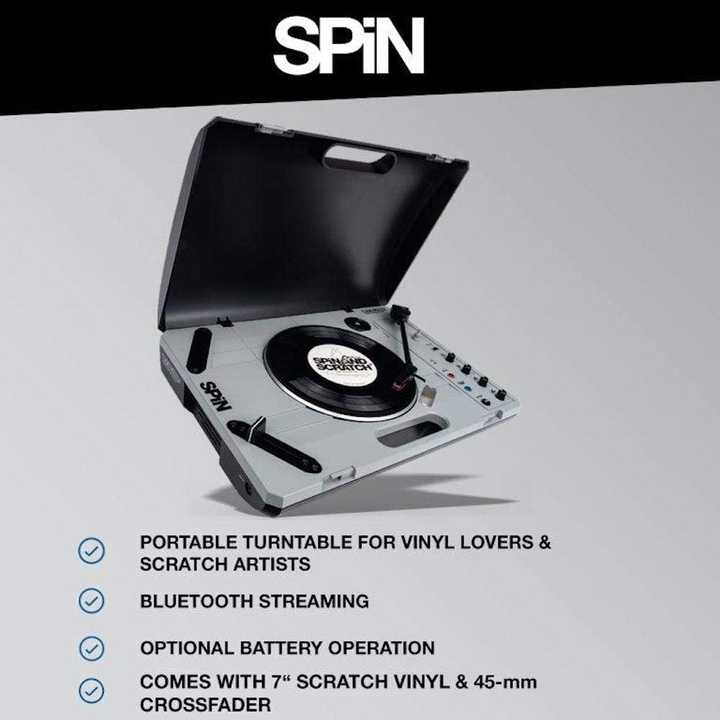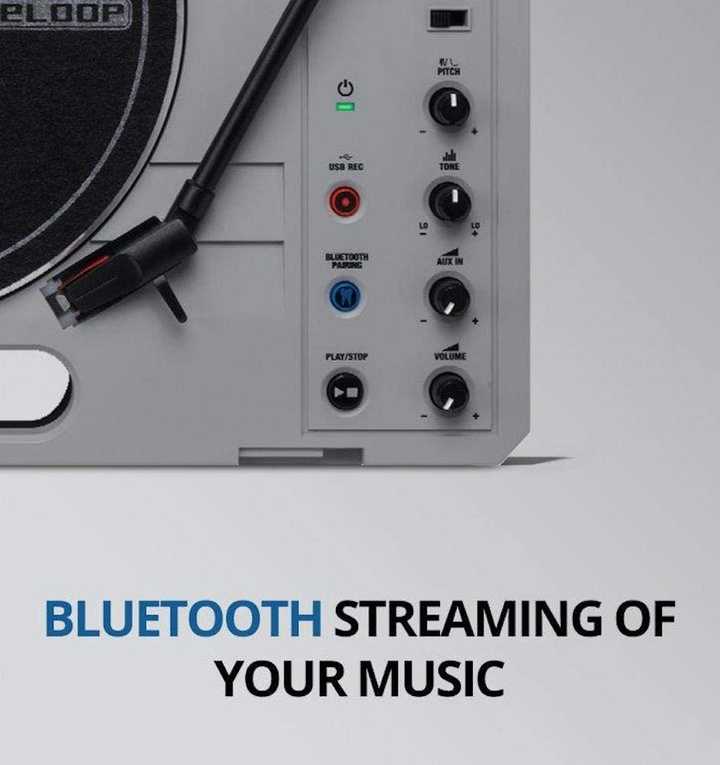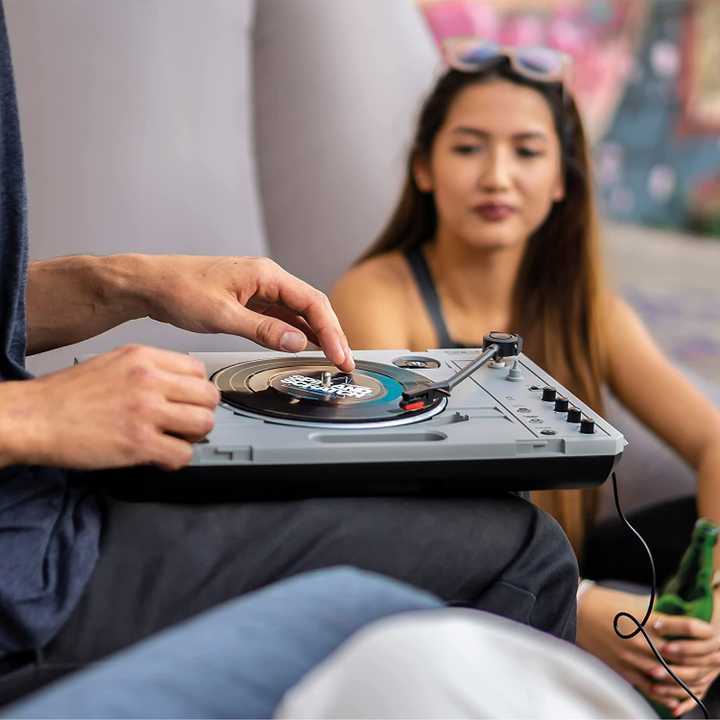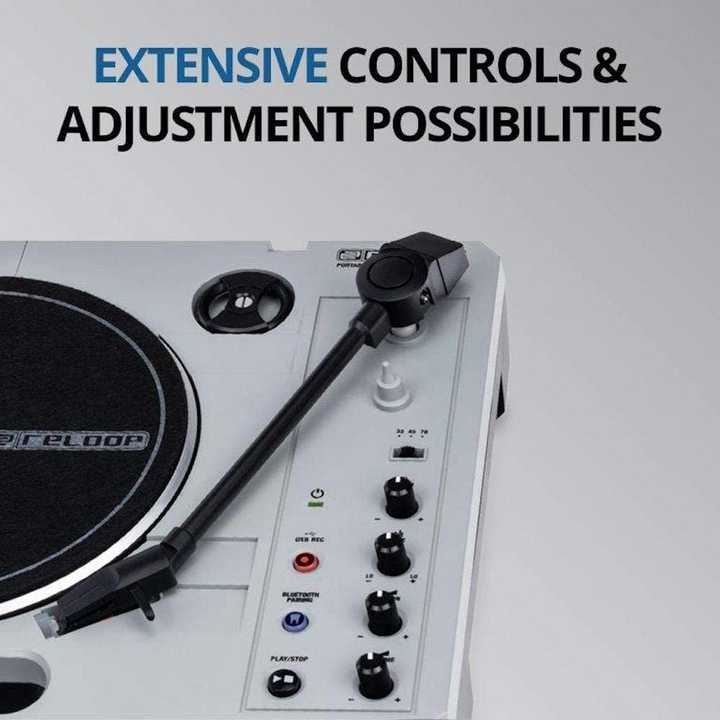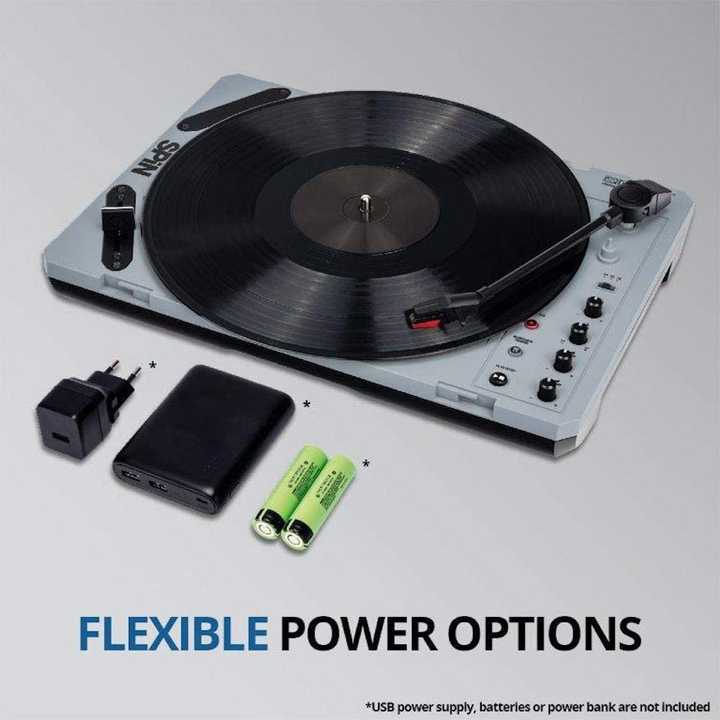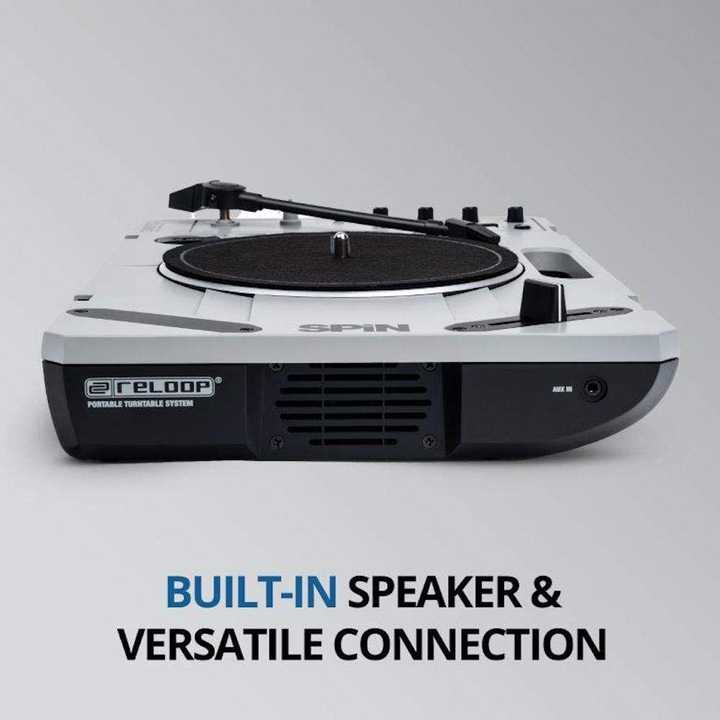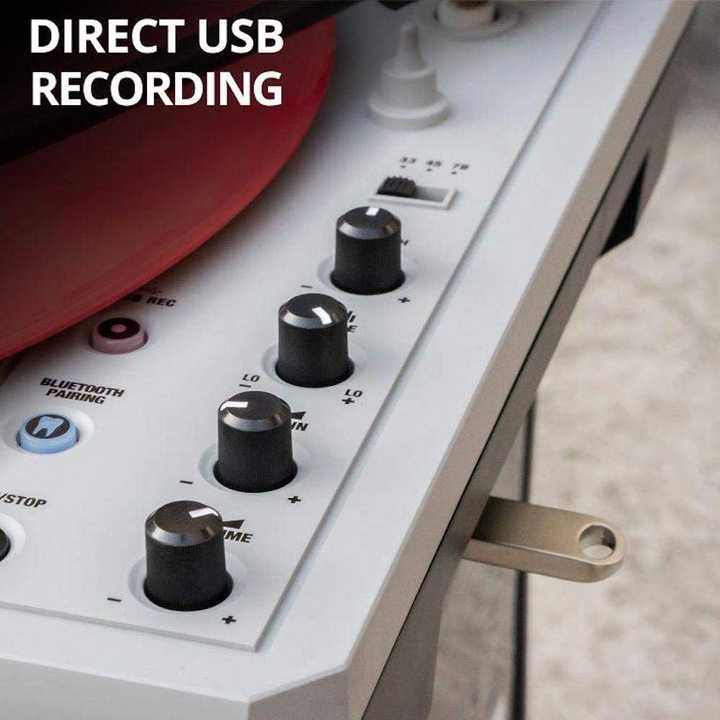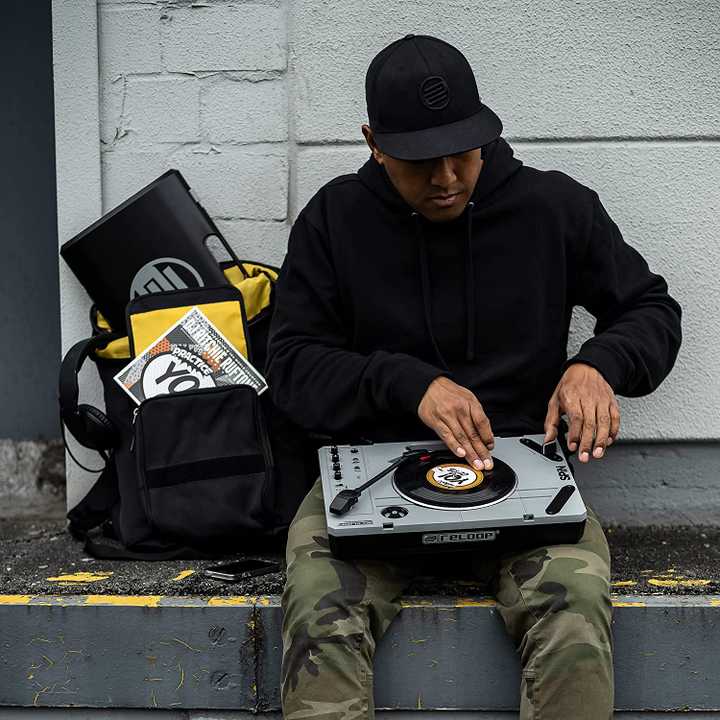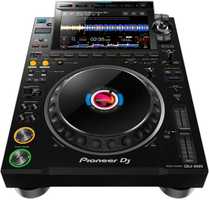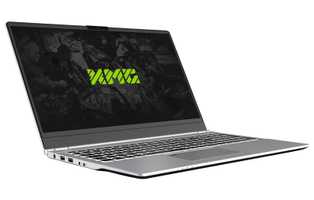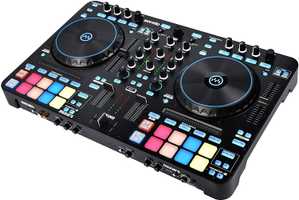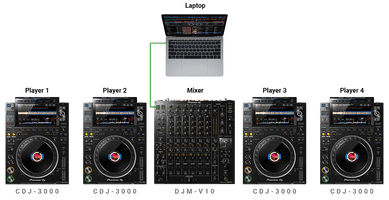Reloop SPIN Portable Turntable Review
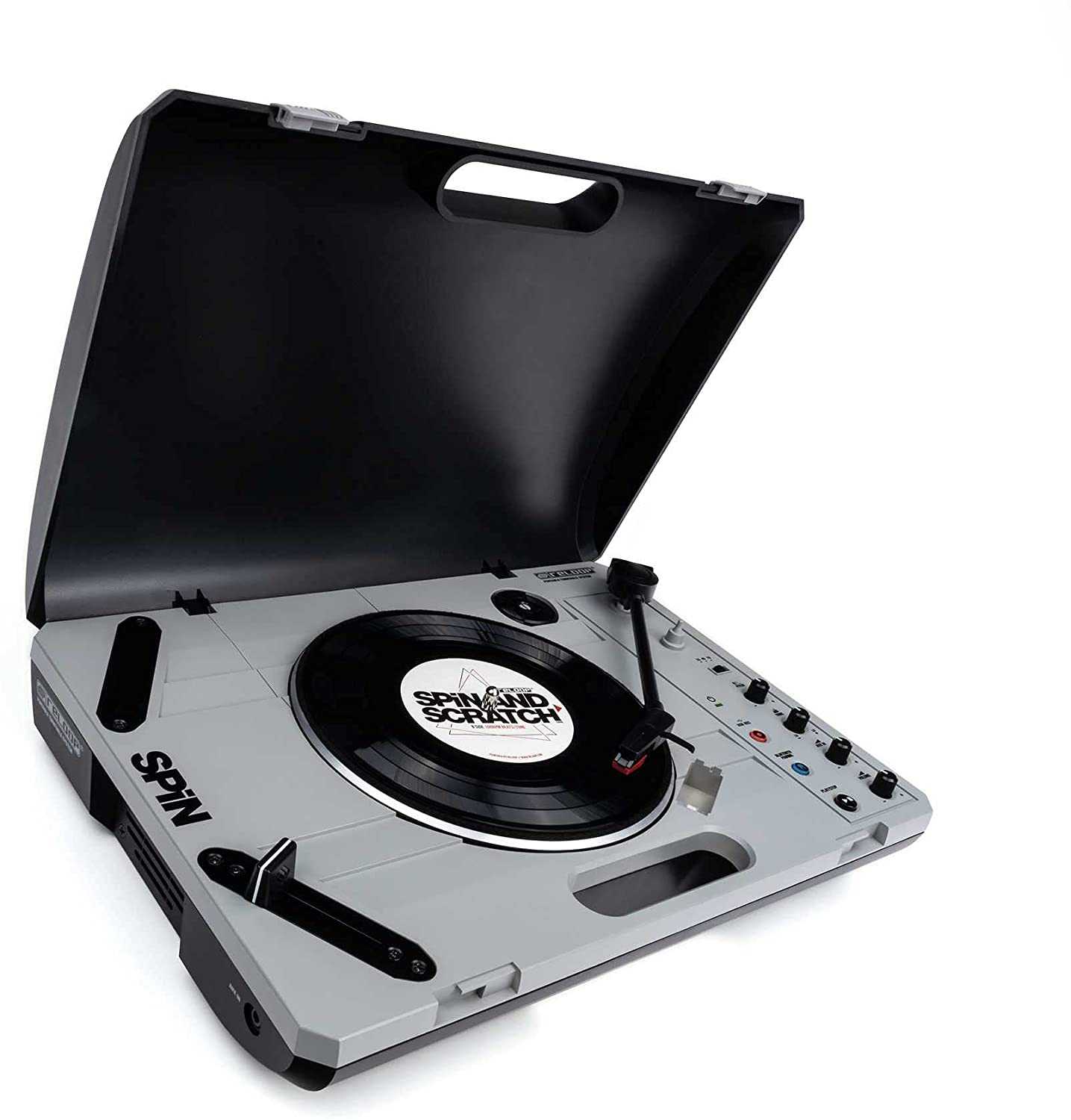
The first thing to say about the Reloop spin itself is that this is surprisingly only the second turntable to hit the mass market which is designed for portable-ism.
Up to now, it’s been either a Numark PT01 scratch or a regular portable with an external fader.
There are at least a couple of other projects coming on with people trying to make other portables turntables but in stores, at the time it’s head to head between this and the PT01 scratch.
What you get
- Belt drive
- Inputs: AUX 3.5 mm stereo, Bluetooth audio
- Outputs: master RCA, USB (USB-A), headphones 3.5/6.3 mm stereo
- Recording format: MP3 with 256 kbit/s
- Recording quality: 16 bit / 44.1 kHz
- Battery type: 2x Li-Ion 18650 (batteries sold separately)
- Power supply: 5V, 2A micro USB (PSU sold separately)
- Dimensions: 370 x 95 x 260 mm
- Weight: 2 kg
BUILD
With a street price of around $200, you can’t go expecting miracles from the build of the spin. It’s an all-plastic belt-drive turntable with the kind of plastic arm and a ceramic stylus that you find on most other portables.
That means it’s never going to full fill the dreams of people like me who deejay with 45s and would love a dedicated high-end portable turntable. But something like that would cost a substantially higher price and is fundamentally a bit to niche to be a viable prospect.
DESIGN
The design is incredibly reminiscent of the old Vestax handy tracks, especially with the lid on. Once you open up things are laid out a bit differently but a lot of the main components are very similar.
The tonearm is bent at the cartridge end and it rests in two places when not on the record. Either on the little knob for temporary placement or down in a slot next to the platter. This slot incorporates the stylus guard and it holds the arm in place very securely while still moving the spin around.
As I already said the cartridge in ceramic style is basic but they are functional and the arm is fairly substantially weighted. Not ideal for your precious vintage vinyl but it does hold the groove very well indeed.
THE PLATTER
The platter is more solid than the PT01 when it comes to up-and-down movement as you push down on the sides which is nice. The top surface is a little grippy for my liking and although it slips pretty well with the supplied Reloop slip mat. I found myself quickly switching out my preferred butter rug and Dr. Suzuki donut combo.
BELT DRIVE
Being belt drive, of course, the motor torque isn’t on a par with direct drive turntables but as I’ve always found on portables it’s plenty good enough, especially as you’re working with 7-inch vinyl which is much lighter than 12-inch.
It’s worth noting that the spin can play 12-inch records just fine. You’re just not going to have a lot of joy scratching with them. I should also mention that you do get a 7-inch battle record included in the box to get you started.
With skips samples on one side and beats on the other which is a great touch. The producer Zhu Cal sampled me saying the spin for the beginning of each side.
POWER
The power system is the best I’ve seen on a portable to date. The spin requires 5-volt power which means you can power it’s of any phone or tablet wall charger with a 2 Amp or higher output.
It would’ve been nice to get one in the box though. And yes that allows you to use a USB power bank which depending on the size of it can allow hours of use away from mains power. That’s not all though.
The battery compartment on the bottom has space for a pair of rechargeable 18650 batteries.
You may not be familiar with those but they’re high-power lithium-ion cells widely used in vape devices. So easy to get hold of.
Even better is that plugging the spin into a wall charger or power bank charges those 18650. I’m sure some people would have preferred a built-in battery which the spin doesn’t have, but I like the way that has done this.
You can carry a couple of power banks or spare 18650s and never run out of juice. The choice is yours.
FRONT OF THE DEVICE
Around the front, you have an aux input for playing beats and the speaker which although not the easiest thing you’ll ever hear. It’s notably louder than the one on the PT01.
On the other side is a Kensington lock which will be important as I’m sure the spin will be bought in great numbers by schools and youth organizations.
Then there’s a USB port for recording. Both sizes of a headphone jack and a master output on RCA. Both the headphones and the master cut out the speaker when they’re connected.
Then you have the power switch and a micro USB port for the power which I’ve already discussed.
THE TOP OF THE DEVICE
Moving onto the top panel all the controls live on the right-hand side. There’s a start/stop button which is one of the first mods that people usually make on other tables. The main volume control is accompanied by the aux input level with a Bluetooth pairing button next to that.
Having Bluetooth on here is fantastic. The best mod I did on my first PT01 Scratch was adding the scratch toys sound plates, which gave me Bluetooth input. Pairing is simple and straightforward and it means you can instantly connect pretty much any phone or tablet without the need for any cables.
I’ve been running it constantly with a table beats up on my iPhone with zero hitches. There’s a tone control that confused me at first turning it counter-clockwise reduces the base.
It’s more of a basic cue and what I would typically expect from a tone control. It works fine though just took me a minute to get my head around.
I am pleased to report it does only affect the and not the aux which is what you want. Above that are the speed controls with a choice of 33 rpm, 45 rpm, and 78 rpm. The pitch control is wide offering plus and minus 20 percent in each direction.
On my unit, the zero marks play it almost plus 4 percent in Serato deejay pro with the upper and lower limits similarly impacted.
But I’ve never known any similar portables to be especially accurate on that front and that will probably change over time as the belt stretches. Is just something to be aware of if using the bend for anything besides cutting.
On a portable table, of course, the fader is hugely important and the situation on the spin is pretty cool. It comes with a full-size 45 mm twin rail Fader which can be placed into either of the two slots whichever way round you like.
So if you decide that you want it on the left but hums to style it’s a two-minute job to swap it over and refit it that way. I’m sure some people would prefer a natural reverse switch but for me, this process is simple enough. As long as you have a screwdriver to hand.
Inside the two slots are identical pairs of connections one red and one white. The white ones are used by the stock Fader and the red ones are to be used by third-party faders making them equally easy to fit.
There’s even the potential to use an extra fader in the second slot as a line fader.
The stock fader performs pretty well with respectably sharp cuts. Well, I do have one criticism: The cut-in distance is rather long.
It’s usable for sure. But I think a lot of users will quickly want to either swap in the third party favor or maybe revive the old credit card mod which the turntable used to do back in the day. But at least if you do decide to swap it out. The process is dead simple.
USB RECORDING
And finally, let’s talk about the USB recording. At this time the spin is selling for about twice the price of the PT01 scratch. And for me, the recording feature alone makes that worth it. It’s very simple you put in a fast 32 formatted stick and press record and press it again to stop.
Levels are all dependent on the spin main controls and it only records at 192K MP3. But that is truly worth its weight in gold. Whether you are shooting videos or just want to hear your cuts back as you practice.
A few weeks back I was in Prague with some colleagues and we decided to shoot some portable cuts on a pedal boat just for fun. But with the PT01 scratch, it wasn’t fun at all.
We managed to sort out the power but we didn’t have the right cables to connect our phones for beats and to record direct audio with the cables we had.
We would be cutting the speaker so Australian who was doing the scratching wouldn’t be able to hear anything. And he wasn’t comfortable anyway as the fader slot was on the wrong side for him.
All of those problems would simply be non-existent on the spin. As much as I will forever give props to the Numark PT01 scratch. If I was buying a portable turntable today even though it cost more. This would be it.
CONCLUSION
There’s no doubt this is a bit of a slam dunk for the company. The features on here are the power management superb the direct USB recording is my favorite feature. Bluetooth connectivity all of that is really good.
DOWNSIDES
The one thing that lets it down ever so slightly, is the cut in the distance on that stock crossfader. It’s just a hair too long but of course, it’s really simple to swap out for a third-party replacement and there are gonna be plenty of those available.
I’m sure there are already two out there. There is the one from Inner Fadder and the one from Jesse Dean's designs. Both of which I have and I’ll be looking for.
If you want the latest and greatest in portable tech, you want something affordable. Getting your hands on the Reloop spin is absolutely the best choice.

